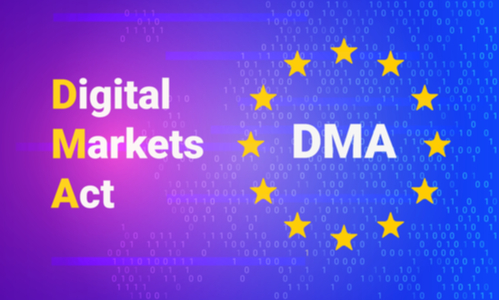
In its inaugural week, the European Union’s Digital Markets Act (DMA) has sparked significant transformations in the operations of major tech conglomerates.
Enforced with the aim of fostering competition within the EU’s digital markets, the DMA designates certain prominent online entities as “gatekeepers,” compelling them to adhere to stringent regulations to mitigate anticompetitive practices, reported The Verge.
The DMA’s impact has already been felt across the tech sphere, with industry behemoths such as Alphabet, Amazon, Apple, ByteDance, Meta, and Microsoft scrambling to align with its provisions. Key alterations include Apple’s concession to permit alternative app stores on iOS, Meta’s commitment to enabling WhatsApp interoperability with other messaging platforms, and Google’s pledge to afford EU users greater control over data sharing preferences.
However, these adjustments may only scratch the surface of the changes catalyzed by the DMA, as dissenting voices contend against the compliance strategies adopted by corporations like Apple, hinting at potential alterations in approach, reported The Verge.
One significant development spurred by the DMA involves Apple’s reversal of its decision to revoke Epic Games’ developer license, following an intervention by the European Commission. This turn of events paves the way for Epic Games to establish its iOS app store within the European Union.
Read more: The EU Digital Markets Act (DMA): A Competition Hand In A Regulatory Glove
Meanwhile, Apple has instituted a policy whereby iPhones departing the EU for an extended period will be barred from updating software sourced from third-party app stores. This move underscores Apple’s efforts to maintain control over its ecosystem while navigating the DMA’s regulatory landscape.
Meta, in response to the DMA, has outlined its plans for ensuring WhatsApp’s encrypted chats remain compatible with third-party services. While the DMA mandates interoperability within three months of request receipt, Meta anticipates potential delays in implementing these changes for public use.
Despite the DMA’s ambitious objectives, skepticism persists regarding its efficacy in reshaping the tech industry’s dynamics. Critics argue that compliance strategies devised by tech giants, largely self-prescribed, may fall short of inducing substantial shifts in power dynamics. Notably, Apple’s compliance approach has drawn criticism for potentially disadvantaging European developers, reported
As the tech landscape continues to evolve under the DMA’s influence, the efficacy and ramifications of these regulatory measures remain subjects of intense scrutiny and debate.
Source: The Verge
Featured News
Big Tech Braces for Potential Changes Under a Second Trump Presidency
Nov 6, 2024 by
CPI
Trump’s Potential Shift in US Antitrust Policy Raises Questions for Big Tech and Mergers
Nov 6, 2024 by
CPI
EU Set to Fine Apple in First Major Enforcement of Digital Markets Act
Nov 5, 2024 by
CPI
Six Indicted in Federal Bid-Rigging Schemes Involving Government IT Contracts
Nov 5, 2024 by
CPI
Ireland Secures First €3 Billion Apple Tax Payment, Boosting Exchequer Funds
Nov 5, 2024 by
CPI
Antitrust Mix by CPI
Antitrust Chronicle® – Remedies Revisited
Oct 30, 2024 by
CPI
Fixing the Fix: Updating Policy on Merger Remedies
Oct 30, 2024 by
CPI
Methodology Matters: The 2017 FTC Remedies Study
Oct 30, 2024 by
CPI
U.S. v. AT&T: Five Lessons for Vertical Merger Enforcement
Oct 30, 2024 by
CPI
The Search for Antitrust Remedies in Tech Leads Beyond Antitrust
Oct 30, 2024 by
CPI